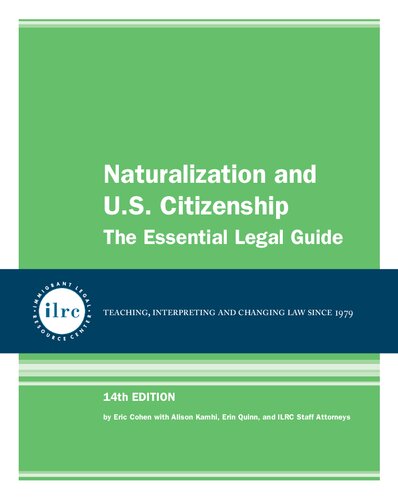Product desciption
Naturalization And Us Citizenship The Essential Legal Guide 14th Edition Eric Cohen by Eric Cohen, Alison Kamhi, Erin Quinn, Ilrc Staff Attorneys instant download after payment.
Naturalization is the final step of the immigration process. After years of struggling to immigrate to the United States for political, economic, or family reunification reasons and several more years of being a lawful permanent resident, one who naturalizes will finally have the opportunity to obtain the rights of a United States citizen.
There are nearly nine million people eligible to naturalize and several million more who will soon be eligible. Thus, there is a growing need for well-trained and informed advocates to be available to help people naturalize.
Although not necessarily the right choice for every lawful permanent resident, naturalization allows people many rights, such as the right to vote, hold public office, and not be deported. Currently, the rights to vote and hold public office are more important than ever before. Throughout many places in the United States the anti-immigrant voices of a vocal minority have created quite a stir. Politicians continue to unfairly blame immigrants for the economic woes we are facing when the facts indicate that immigrants actually contribute more in tax revenue to this country than they use in government resources. The facts are that immigrants are often small business owners, and professionals, do much of the hard labor and service industry work that our country needs so much, and contribute to the much valued diversity and cultural richness of our society.
Some politicians and other anti-immigrant voices have started a war against immigrants. The politicians are trying to deny hard working, law abiding, and taxpaying people such basic rights as the right to educate their children and obtain emergency and prenatal medical care. Yet, the voices of immigrants can be heard. Immigrants can and are batting back. They can have a say in what laws are passed and which politicians are elected. However, the success of the fight for fair treatment for immigrants depends on more immigrants naturalizing, registering to vote, voting, and even running for office. Presently there are hundreds of thousands of lawful permanent residents applying for naturalization and many more eligible to apply. It is our job to help all the immigrants that want to naturalize do so.
At the ILRC, we have always been committed to encouraging self-help as an element of legal practice and social change. The preparation of naturalization cases provides an arena for that philosophy—a philosophy that underlies our resolution to train more and better community lawyers and paralegals. Our goal is to help create advocates with a better understanding of the complex sources of subordination experienced by immigrants, the poor, the disadvantaged, people of color, and other groups. We envision advocates who use a more humble approach to advocacy—not viewing their role as that of the knight in shining armor, but rather respecting the abilities, talents, and judgment of clients themselves and working with those clients in developing sensible and meaningful strategies and tactics—some of which are likely to be more creative than the usual approaches. These representatives recognize the need to demystify the legal process in order to bring out the talents and imagination of their clients; they strive not to make the legal worker-client relationship yet another subordinating experience.
This approach to immigration practice is one in which the advocate strives to know as much about the community served as possible by reading, talking, exploring, walking, eating, and perhaps living in and being from that community. The legal worker would be aware of the limits of his or her own technical expertise, and spend time identifying, developing, learning about, getting acquainted with and using other allies and resources in the community, especially other community members and clients themselves.
We hope others share in the views we articulate in this preface and find this publication helpful in assisting millions of people realize their dream of becoming United States citizens.


